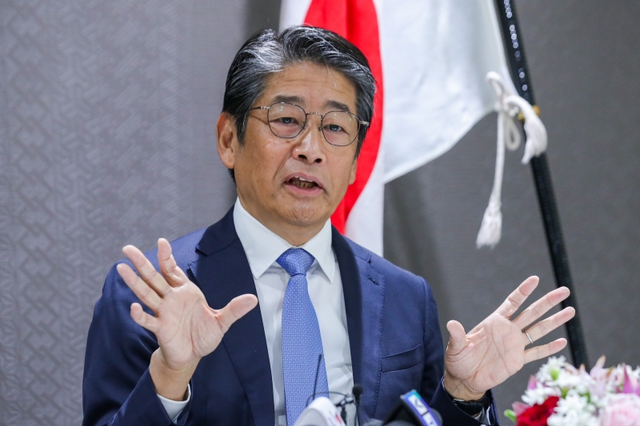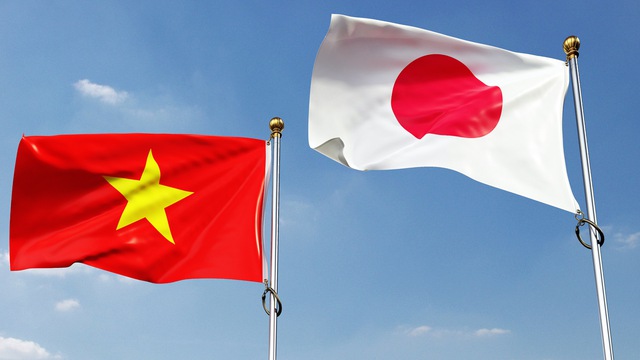80th National Day anniversary:
Japan vows to back Viet Nam's development path
VGP - Viet Nam is now strategically developing its transportation, energy and digital infrastructure as the driving force behind its "New Era" and pursuing the goal of becoming a high-income advanced nation by its centennial. Japan remains committed to cooperating with the advancement of these efforts, and expects to see continuation of the reform, said Japanese Ambassador to Viet Nam Ito Naoki.

Japanese Ambassador to Việt Nam Ito Naoki
On the occasion of the 80th anniversary of the August Revolution and National Day (September 2, 1945 – September 2, 2025), could you please share your insights into Viet Nam's economic, political, and diplomatic achievements over the past 80 years?
Ambassador Ito Naoki: First of all, I would like to congratulate Viet Nam on the 80th anniversary of the August Revolution and National Day. Japan welcomes that Viet Nam is leaping for the "New Era" and has been putting forward the rapid reform under the leadership by H.E. Mr. To Lam, General-Secretary of the Communist Party of Viet Nam.
Looking back the past 80 years, after the war period, Viet Nam has overcome the economic slow-down caused by war and has achieved remarkable development led by manufacturing and IT industries, showing the steady outcome of Viet Nam's "Doi Moi" policy.
Furthermore, in the political and diplomatic spheres, Viet Nam has pursued an independent and self-reliant foreign policy, respecting the basic principles of international law and the UN Charter, and contributing to regional peace and stability. Amidst the uncertain international situation, Japan views that maintaining and strengthening an international order based on the rule of law, just as Viet Nam does, is highly significant.
In your opinion, how have Viet Nam's social welfare policies and people's living standards changed over the last 80 years?
Ambassador Ito Naoki: The pivotal turning point I believe was undoubtedly the Doi Moi policy launched in 1986. Under this reform, Viet Nam has introduced market economy, leading to significant economic growth and substantial improvement in people's living standards.
Since the 1990s, poverty rates have dramatically decreased. Significant improvements in education and healthcare, including increased primary school enrollment and better maternal and child health services, were implemented in cooperation with international aid.
In 1992, Japan resumed its ODA to Viet Nam. We have stood by Viet Nam in formulating development policies through intellectual policy support represented by "the Ishikawa Project." Furthermore, as the largest donor, Japan has been supporting Viet Nam by implementing a wide range of projects not only in the field of infrastructure, energy, urban development, but also in social sectors such as education, health and disaster risk reduction. In the private sector, we believe Japan's early investment in motorcycle and automobile industries accelerated the economic growth and industrialization of this country. I am proud that Japan greatly contributed to the social-economic development of Viet Nam over the years.
In its reform towards the "New Era," Viet Nam positions the private sector as the most important driving force of the national economy and is rapidly improving its business environment. The continuation of these reform efforts put forward by Viet Nam will offer opportunities for Japanese companies to expand investment, and thereby contribute to the deepening of economic partnership between the two countries.
Your comments on Viet Nam's role and position in the region and in the world?
Ambassador Ito Naoki: Amidst significant geopolitical shifts in the world, Viet Nam has demonstrated numerous diplomatic initiatives, including hosting of the ASEAN Future Forum and the P4G Summit, and promoting cooperation with African nations. I am confident that Viet Nam's role and position in the regional and international communities are expanding.
Japan welcomes that these diplomatic initiatives will broaden the range of our cooperation with Viet Nam. We hope Viet Nam will play an even greater role in promoting peace and stability in the region and the world. To that end, Japan wishes to continue its close collaboration as an indispensable partner, working together to realize a Free and Open Indo-Pacific.

Japan pledges to fully support Viet Nam's efforts to achieve the national goal by the centennial and develop the bilateral ties to the highest level over the next 20 years
How the Viet Nam – Japan relations have progressed since the establishment of diplomatic ties?
Ambassador Ito Naoki: Since the establishment of diplomatic relations in 1973, Japan and Viet Nam have enjoyed numerous high-level exchanges. Visits to Viet Nam have included those by His Majesty the Emperor (then Crown Prince) in 2009, Their Majesties the Emperor and Empress Emeritus (then Their Majesties the Emperor and Empress) in 2017, His Imperial Highness Prince Akishino in 2023, the Prime Ministers of Japan and others. In reciprocal visits, Viet Nam's leaders, including the General-Secretary of the Communist Party of Viet Nam, the President, the Prime Minister, and the National Assembly Chairman, have also made numerous visits to Japan.
Over the past 50 years, the relationship has seen many important milestones, including the establishment of the Japan-Viet Nam Parliamentary Friendship League in 1978, the resumption of ODA in 1992, the beginning of high-level exchanges initiated by Prime Minister Vo Van Kiet's visit to Japan in 1993, visit by then Prime Minister Murayama Tomiichi as the first Japanese Prime Minister to visit Viet Nam in 1994 and the visit of Their Majesties the Emperor and Empress (now Their Majesties the Emperor and Empress Emeritus) to Viet Nam in 2017.
Most notably, a significant milestone that heightened the Japan-Viet Nam relationship to its current high point was the elevation of the bilateral ties to the "Comprehensive Strategic Partnership for Peace and Prosperity in Asia and the World" in November 2023. This marks a new stage in the deepening and expansion of Japan-Viet Nam relations, coming at the momentous 50th Anniversary of the establishment of our diplomatic ties.
Furthermore, in April this year, Japan's Prime Minister Ishiba Shigeru visited Viet Nam and held meetings with high-level leaders including General-Secretary To Lam and Prime Minister Pham Minh Chinh. Prime Minister Ishiba expressed his support for the direction of reforms advocated by General-Secretary To Lam and stated that Japan would continue to cooperate with Viet Nam as an indispensable partner.
Under the leadership of General-Secretary To Lam, Viet Nam is now leaping towards the "New Era." This "New Era" presents a great opportunity for both of us to further develop the relationship between our two countries. As Ambassador of Japan to Viet Nam, I wish to evolve the relationship of trust and friendship between the two countries into an even deeper one.
Could you share your feeling on Viet Nam's National Day, the spirit of national reconciliation, and your expectations for Viet Nam's development in the new era? What message would you like to convey to the people of Viet Nam on the occasion of September 2?
Ambassador Ito Naoki: Throughout its long history of national defense and struggle, the Vietnamese people have persevered with patience, resilience, and unwavering fortitude. The achievement of reconciliation and national unity after the war is solely attributable to the people's firm spirit of self-reliance and strong unity, for which I express my deep respect.
Viet Nam is now strategically developing its transportation, energy and digital infrastructure as the driving force behind its "New Era" and pursuing the goal of becoming a high-income advanced nation by its centennial. Japan remains committed to cooperating with the advancement of these efforts, and expects to see continuation of the reform. Furthermore, we highly value Viet Nam's endeavor to play a more proactive and responsible role in the international community.
As Ambassador of Japan to Viet Nam, I will continue to fully support Viet Nam's efforts to achieve the national goal by the centennial. To that end, I am devoted to developing Japan-Viet Nam relations to the highest level over the next 20 years./.

